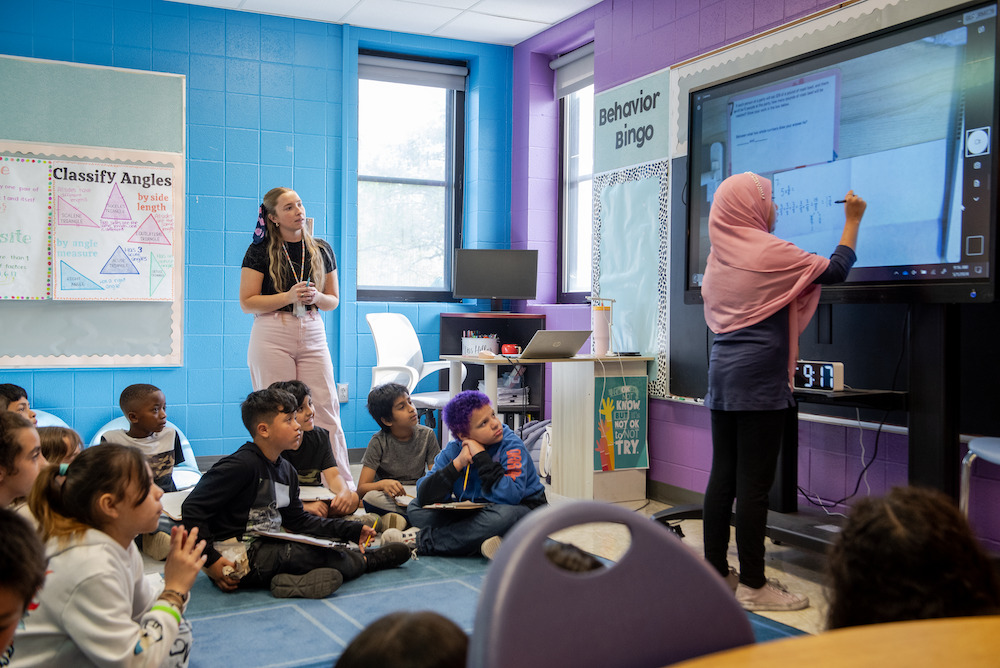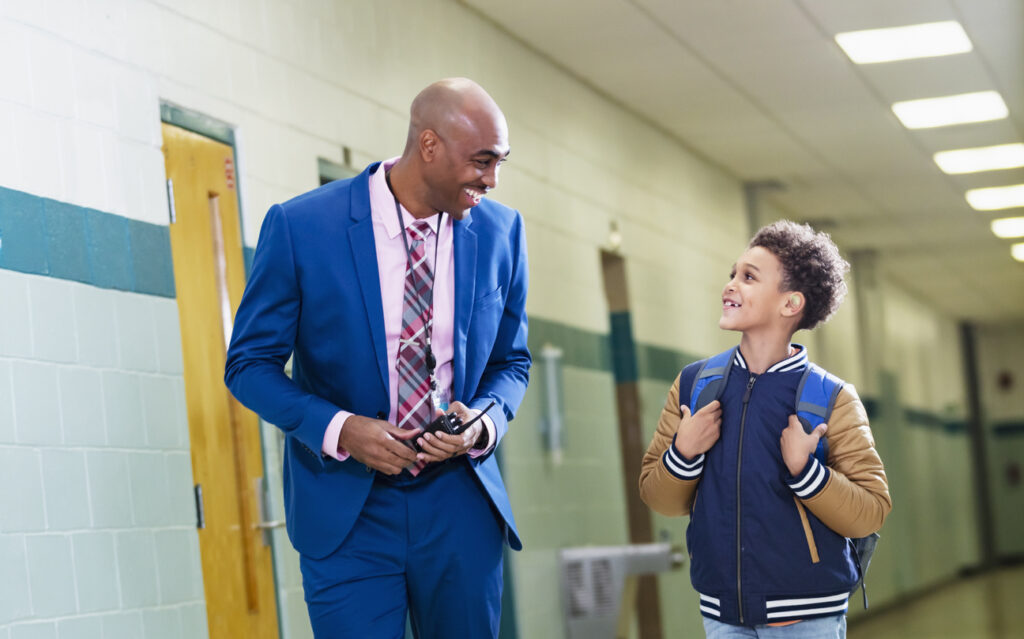EF: That maps as so true both with my own teaching and leadership experience. I want to dig in more into this notion of authentic, respectful relationships across lines of difference. What you have learned about how to form relationships across lines of difference that are respectful, even if you’re coming into it with biases? Just the story of your mother’s interaction is still ringing in my ears.
RC: A couple of things. One is I keep coming back to critical awareness, to your point around how we all are coming in with biases. We don’t always all recognize that. What has been elevated more clearly in our current political climate and the protests is that the fear of being thought of as racist is one that stops critical reflection. I can’t say enough that self-awareness and actually being able to allow yourself to recognize that you could be contributing to systematic racism is one of the most critical steps. A lot of our training will take educators through that, and I think that’s the first critical step. The second one when we think about that research around even intimate relationships, that 5 to 1 ratio of positive versus negative interactions. So, “How critically are you thinking about what you’re putting into the relationship?” is something that we have educators reflect on. The other thing that we champion as one strategy for relationship building is home visits. That’s one way, but there are so many ways to start to build authentic connections. One of the things that we’ve heard from families is that when they first experience home visits where the agenda was theirs and it was just about getting to know them and their child, it wasn’t to tell them what they needed to do, it wasn’t about telling them all the rules and all the regulations. It was about asking: What are your child’s hopes and dreams? What do you want for your children? What are you concerned about? What expectations do you have for me? The belief that this is a true partner is so critical to how we often talk about: It’s not what you do, it’s how you show up to do what you’re doing. Those core beliefs around critical reflection, how you show up, and having a genuine interest because you believe that this person has knowledge and value, are the fundamentals in any relationship that we have. That is the same with families and with students.
EF: What do we know doesn’t work?
RC: One thing we know is that not having a common definition of what it means to engage families is critically damaging. We found when we were talking to more than 300 different stakeholders across DC, everyone was saying “family engagement,” but meant something specifically different, from fundraising, to families coming to potlucks, to making sure homework is done. Having a true common definition around what family engagement is, which at Flamboyan we define as the partnership between families and educators that supports student learning. We put learning at the center and the student at the center of what the engagement is for. It’s not for fundraising, right? That could be important for a school, but that is not the critical definition of what we see as a family’s role.
We also know that thinking about family engagement as not connected to academics doesn’t work. We have to see the interconnection of family engagement as an academic strategy. It’s not a feel-good strategy. It’s not a nice-to-have strategy. At the University Chicago, there was a study on the turnaround efforts across the schools in Chicago. When they were looking for what factors made a difference, family engagement was among, leadership was among being able to have a strong curriculum, it was among safety. So, we have to see the interconnected nature of family engagement and not think about it as a one-off isolated incident.
Not thinking about education through an anti-racist lens doesn’t work. We’ve seen it. We know it. I think and I hope that you know, we can be more critical of ourselves as we approach reopening. Because inequities have been shined on—the light is clear. The question is, How will you respond? It’s much easier to recreate systems of oppression. We have to know and recognize that it’s not working for the same kids and the same families and we have to do something different. Without that lens, we know that we will recreate systems that disadvantage Black and Brown students.
EF: I do think there’s a consciousness about parents’ role in supporting student learning that’s amplified right now in a lot of good ways. It does feel like the tactics and strategies towards that might be different in the current context. What should school leaders be thinking about if they’re not able to do a home visit but still want to achieve that same aspiration?
RC:, I think that’s when we go back to the fundamentals of relationship building. As we’ve been talking to a lot of families and really ensuring the District of Columbia makes sure that their reopening plan is informed by family and student perspective, we’re learning that families are not a monolith. They all have their own individual thoughts and experiences. Some families love daily communication during distance learning. Other families felt like it was a sign of distrust, that they didn’t believe that they could do the job. Communication is going to be key regardless and making sure we understand, How do families want to be communicated with? What’s their preferred method? What frequency? So, letting families be able to make the decisions and then providing and being able to differentiate your support is critical. Listening is not a skill that we do well as humans. Listening openly to families about their students and about their experiences is going to be critical. We actually have educators practice empathic listening as a skill in our professional development, practicing listening, and not saying “I” and not bringing it back to yourself. That’s so much of our default. When we do this with educators, they’re like, “That’s weird. I don’t like it. I want to make connections.” That’s fine and there’s a place for that, but there’s a place for actually, How do I listen and only consider and think about the experiences of those that I’m listening to, and not conflate my own experiences? I think that that’s going to be really important. During times of stress we know we are pushed further into our negatively held beliefs sometimes, and we’re pushed deeper into our biases. So, we need that level of listening openly and critically being aware of, What am I assuming? There’s a lot of assumptions that we try to make sense and to create order within the pandemic. Being conscientious of our listening ability, of how we’re making meaning from what we’re hearing, and then asking ourselves, What are we assuming? are going to be really important factors no matter what strategy. You can certainly replace a home visit with a video call, and I can show you my home right now and do a tour and have a conversation that’s all about us as humans. Again, how am I showing up to the conversation? How do I reflect beforehand? How do I reflect after? And how do I listen well?
EF: That’s so profound. I’m making huge connections to the comment you made about how stress brings us more into negative beliefs. Something about that comment is explaining the world right now. Robert, thank you so much. Any final thoughts?
RC: One, recognizing what we’re trying to accomplish has not been done. The system has not been created to equitably serve all students since its inception. We have to be okay with one, recognizing that, being conscientious of reproducing it and talking to families and students, and really get grounded with our colleagues that have expertise in being anti-racist. We have to see that as a fundamental part of education. I think that this dialogue is great. I hope that we leverage this moment in history because everyone is watching for how do we respond in education. We have a great opportunity and I do believe that there are great enough people that will allow us to rise up if we’re willing.
EF: I appreciate that so much. Thank you, Robert Crosby of the Flamboyan Foundation for the conversation about parent engagement.




